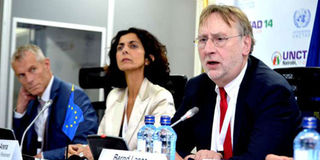EU opposes bid to give teeth to UN body

From left: European Union Members of Parliament Helmut Scholz and Maria Arena and Committee for International Trade chairman Bernd Lange at a media briefing at the 14th session of the United Nations Conference on Trade and Development at the Kenyatta International Convention Centre in Nairobi on July 20, 2016. PHOTO | SALATON NJAU | NATION MEDIA GROUP
What you need to know:
- On Wednesday, a delegation from the European Parliament argued that giving the United Nations Conference on Trade and Development more teeth will create duplication because there were other international bodies already handling these issues.
The European Union, which is one of the main negotiating blocs here, is opposing the proposal by the G77 and China.
The European Union (EU) has opposed a bid by developing countries to change the mandate of the United Nations Conference on Trade and Development (Unctad) to make it the main agency for addresssing trade inequalities in the world.
This is one of the contentious issues threatening a positive outcome from the ongoing Unctad14 meeting in Nairobi.
On Wednesday, a delegation from the European Parliament argued that giving Unctad more teeth will create duplication because there were other international bodies already handling these issues.
“The question is how far the Unctad shall work. Is Unctad an advisory organisation, a capacity building organisation or a lawmaking body?” asked Mr Bernd Lange, the chair of the Joint Delegation of Trade and Development Committee of the European Parliament.
“Our position is that we have the World Trade Organisation and we have other organisations where laws have to be created. Unctad is playing a big role for the G20 for example. G20 is one of the right organisations where the question of text has to be discussed,” he added.
By this assertion, the EU, which is one of the main negotiating blocs here, is opposing the proposal by the G77 and China, to which Kenya is a member.
At the start of Unctad 14 last weekend, the G77+China group asked delegates to consider giving Unctad more teeth to address challenges of trade imbalances, tax dodging, debt management and other issues related to development.
“We reiterate that the global economic, financial and trading system, including multilateral trading system remains unbalanced, that global inequality remains with many still in the abyss of poverty,” the group said in their proposed declaration.
It further stated: “We call for the strengthening of Unctad’s mandate and its three pillars ... recognising its central role as the focal point within the United Nations for integrated treatment of trade and development”.
Unctad, which is a UN body formed in the 1960s, was meant to address issues of market access and trade tariffs for new nations, especially those that had gained independence at the time.
Its three pillars were research and analysis, building consensus among nations and helping in technical cooperation.
ADDRESS PROBLEM
Developing nations like Kenya think having a stronger Unctad will address the continual problem of tax cheating, sovereign debt management and sharing of new technology.
But in the search for a final document called the Nairobi Consensus, the Unctad meeting has brought four different negotiating sides.
These include the EU and G77+China. Others are Japan, US, Canada, Australia and New Zealand, which are pushing for a common position, and Russia and its neighbours outside the EU, and those considered as Group B countries on another side.
The European parliamentarians called for better “protection of investments” as long as investors work within what they called “sustainable development” parameters. They also supported calls to address tax cheating. The question is how the delegates will frame the document.
On Wednesday, Kenya’s permanent representative to the UN in Geneva, Dr Stephen Karau, said the general issues under negotiation will be the Sustainable Development Goals (SDGs), foreign aid and development assistance, taxation rules, debt restructuring and gender issues in trade.
But he refused to discuss whether the issues raised by the EU had derailed the talks, only saying the matter could not be discussed with media.
“Everybody’s interests need to be taken into account because the outcome of the negotiations is like a political manifesto,” Dr Karau told the Nation. “The main thing that we are addressing is the SDGs because after this meeting, members will have to use the outcome as a reference point going forward.” In a press briefing, Foreign Affairs Cabinet Secretary Amina Mohamed, who is the president of Unctad 14, played down the disagreements.
“We are progressing well and delegations are showing flexibility on some of the issues under discussion. I will provide more details on this once the negotiations are concluded,” she told journalists at the KICC.
Besides the disagreement on the mandate of Unctad, delegates are also faced with the sticking issue of non-tariff barriers.
Unctad revealed that developing countries are losing up to $23 billion (Sh2.3 trillion) worth of exports for failing to meet health, environmental and other policy restrictions on their goods. Though some of the conditions are legitimate, the UN agency argued they have to be checked because they add to exportation costs for traders despite a decline in tariffs over time.
“We certainly don’t expect G20 countries to drop all their non-tariff measures, which serve important policy objectives such as health and safety, but we do need to manage this issue better,” Unctad deputy secretary-general Joakim Reiter, said in a statement.




